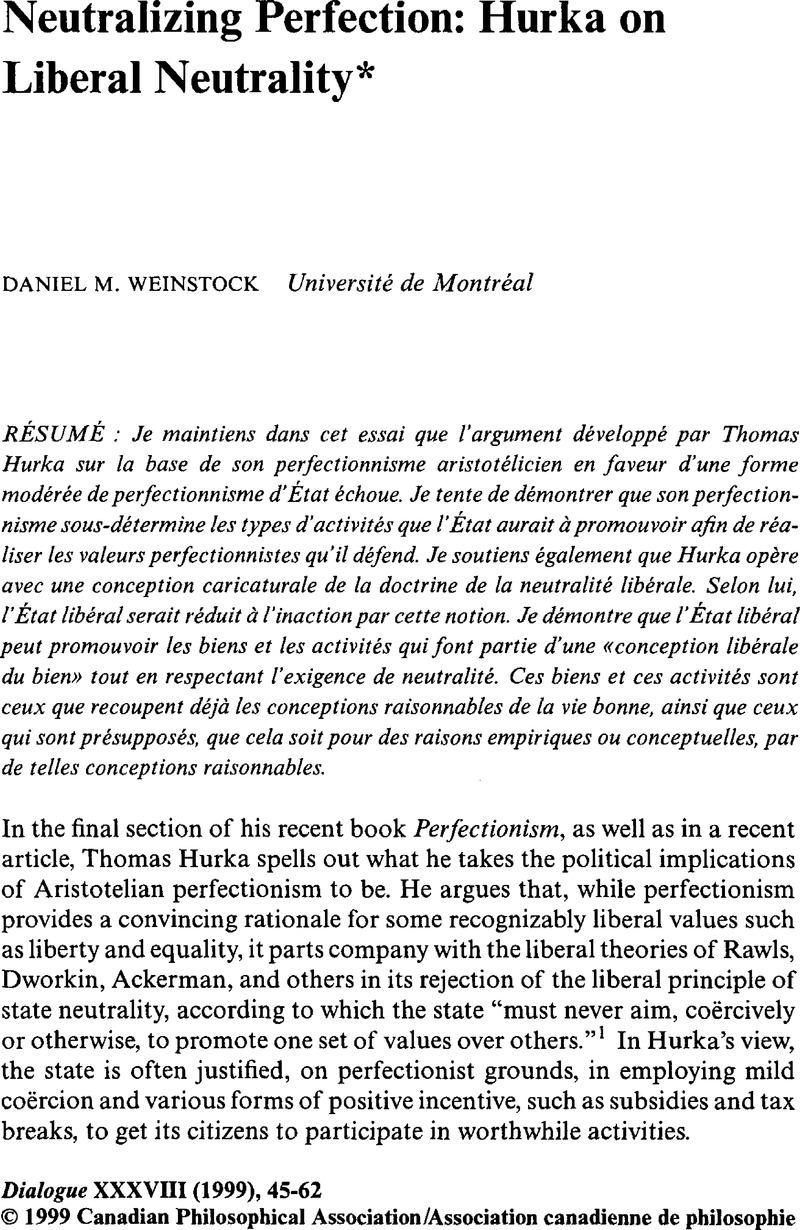Article contents
Neutralizing Perfection: Hurka on Liberal Neutrality*
Published online by Cambridge University Press: 13 April 2010
Abstract

- Type
- Articles
- Information
- Dialogue: Canadian Philosophical Review / Revue canadienne de philosophie , Volume 38 , Issue 1 , Winter 1999 , pp. 45 - 62
- Copyright
- Copyright © Canadian Philosophical Association 1999
References
Notes
1 Hurka, Thomas, Perfectionism (Oxford: Oxford University Press, 1993), p. 159Google Scholar. Hurka makes the case for state perfectionism out more fully in an article published shortly after Perfectionism. See Hurka, Thomas, “Indirect Perfectionism: Kymlicka on Liberal Neutrality,” The Journal of Political Philosophy, 3, 1 (March 1995).CrossRefGoogle Scholar
2 After this article had been accepted for publication, Sher's, GeorgeBeyond Neutrality: Perfectionism and Politics (Cambridge: Cambridge University Press, 1997) appearedCrossRefGoogle Scholar. It now constitutes the most systematic and thorough going perfectionist critique of the doctrine of liberal neutrality. I regret that I have not been able to take account of it in this article, but I hope to do so in future work.
3 This line of argument was raised by one of the anonymous referees for Dialogue.
4 I am using the term quite differently from the manner in which Hurka himself uses it in Perfectionism, pp. 62ff.
5 See, for example, Hurka's discussion of the case of T. S. Eliot in Perfectionism, p. 56.
6 These arguments were presented to me by Tom Hurka in the extensive written comments he provided to an earlier draft of this paper.
7 “All other things being equal,” because a liberal will have to weigh the considerations of equal opportunity which militate in favour of supporting the unpopular activity carefully against other considerations. She will have to distinguish between cases in which the greater expense of the activity in question really does stem simply from its (contingent) lack of popularity, and cases in which it is due to its reliance, say, on extremely limited resources, which make it the case that the activity in question could not possibly attract a great number of adherents, and is therefore, as it were, necessarily unpopular. In cases such as the latter, it seems fair that the individual in question bear the burden of her expensive tastes. Also, the liberal will have to consider society's overall level of resources to determine whether unacceptable costs (in terms, for example, of other sets of worthwhile preferred activities) are involved in satisfying an unpopular preference.
8 This formulation actually belongs to Charles Taylor, another philosopher who has mistakenly taken liberals to be putting the principle of neutrality forward as a principle of unrestricted scope and force. See his “Reply and Re-articulation,” in Philosophy in an Age of Pluralism: The Philosophy of Charles Taylor in Question, edited by Tully, J. (Cambridge: Cambridge University Press, 1994), p. 250.CrossRefGoogle Scholar
9 For example, see Perfectionism, p. 100.
10 “Extent” and “dominance” are defined by Hurka, respectively, as the degree to which an intention “stretches across time and objects, including persons,” and that to which “it has many others subordinate to it in a rational hierarchy.” See Hurka, Perfectionism, p. 116.
11 See ibid., pp. 137–38.
12 I am aware of the large metaethical issues that this claim touches upon, and wish simply to set them aside for the purposes of this discussion. My view is that reason underdetermines, but is not completely irrelevant to, the formation of beliefs about the good life. As my argument in this paper simply requires underdetermination rather than full-blown non-cognitivism, I will let metaethical issues rest for the time being by assuming that the beliefs discussed all pass a rational threshold.
13 The distinction presented in the following paragraph can be found in slightly different forms in the following works: Rawls, John, Political Liberalism (New York: Columbia University Press, 1993)Google Scholar; Kymlicka, Will, “Liberal Individualism and Liberal Neutrality,” Ethics, 99 (1989): 883–905CrossRefGoogle Scholar; and De Marneffe, Peter, “Liberalism, Liberty and Neutrality,” Philosophy and Public Affairs, 19 (1990): 253–74.Google Scholar
14 For example, see Kymlicka, «Liberal Individualism and Liberal Neutrality,” pp. 884–85, and Rawls, Political Liberalism, pp. 192–93.
15 A further restriction on the principle of neutrality, one which would allow an even broader range of substantive values into the justification of political and legal norms, has been proposed by some writers. According to John Rawls, for example, the justification of norms and principles need only proceed neutrally when issues of basic justice or of constitutional essentials are concerned. See his Political Liberalism, p. 214. The restriction, however, strikes me as implausible. For decisive criticism, see Greenawalt, Kent, “On Public Reason,” Chicago-Kent Law Review, 69 (1994): 669–89.Google Scholar
16 Some of the principal recent discussions are: John Rawls, Political Liberalism, chap. 6; Solum, Lawrence B., “Constructing an Ideal of Public Reason,” San Diego Law Review, 30 (1993): 729–62Google Scholar, and “Inclusive Public Reason,” Pacific Philosophical Quarterly, 75 (1994): 217–31CrossRefGoogle Scholar; Kent Greenawalt, “On Public Reason” Cohen, Joshua, “Procedure and Substance in Deliberative Democracy,” in Democracy and Difference, edited by Benhabib, Seyla (Princeton: Princeton University Press, 1996), pp. 95–119Google Scholar; and Gutmann, Amy and Thompson, Dennis, Democracy and Disagreement (Cambridge, MA: Harvard University Press, 1996).Google Scholar
- 2
- Cited by




